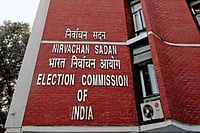Delhi Health Minister Satyendar Jain on Sunday welcomed the approval given for the emergency use of two Covid-19 vaccines and asserted that the city government is all set for the vaccination roll-out as soon as any of them arrive.
Interacting with reporters, he said, in the first phase, about three lakh healthcare workers and nearly six lakh frontline workers, totaling about nine lakh, will get the vaccine.
"Drug Controller General of India has approved emergency use of two vaccines. Many congratulations to scientists and researchers who worked day and night to make this possible," Jain said.
India's drugs regulator has approved Oxford Covid-19 vaccine Covishield, manufactured by the Serum Institute, and indigenously developed Covaxin of Bharat Biotech for restricted emergency use in the country.
It paves the way for the roll out of at least two vaccines in the country in the coming days.
"We are all ready with our preparations, from storage to logistics, and yesterday, a dry run was conducted at three sites to assess the preparedness for the vaccination roll-out. Vaccination can begin, soon as the vaccine arrives in Delhi, which we expect in few days," he said.
Delhi recorded 424 fresh Covid-19 cases, the lowest in over seven months, and 14 new fatalities on Sunday, even as the positivity rate slipped to 0.62 per cent, authorities said.
The infection tally in the city stands at over 6.26 lakh and the death toll rose to 10,585, they said.
Delhi had recorded 494 cases on Saturday while the positivity rate had stood at 0.73 per cent.
Jain on Saturday had tweeted that the positivity rate had been below one per cent for the past 11 days, and fresh cases were the lowest since May 17.
"So, the Covid-19 situation is significantly under control, and we thank people of Delhi for their cooperation, they must continue to wear masks and take precautions," he said on Sunday.
Asked if the Covid-19 Care Centres will now be closed, he said, the Delhi government is "treading very cautiously" and is not making decisions in a haste. He said, it was better to be on the safer side, as the new strain had been detected, so "we can't lower our guard".
"Also, even after de-escalation of COVID-19 beds, there are still 10,500-11,000 available.
We shall be repeating the exercise of de-escalation next week," he added.






.jpg?w=801&auto=format%2Ccompress&fit=max&format=webp&dpr=1.0)



















